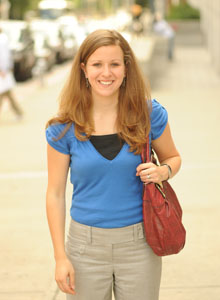Offering Relief to Victims
More than one million people are victims of intimate-partner violence or domestic abuse each year, and national surveys suggest that more than 50 percent of the resulting incidents may go unreported. When the victim is an undocumented immigrant, the likelihood of reporting any type of crime will drop further. College of Law alumna Nicole Sykes ('12) will put her legal education to work this fall bringing justice to abusers and sanctuary to their victims.
Two things make this worthy goal possible: a coveted Equal Justice Works fellowship sponsored by international law firm Greenberg Traurig and medical technology company Medtronic, and a relatively new type of visa offered by the U.S. Citizenship & Immigration Service called the U-Visa, which grants temporary resident status to victims of crime who comply with law enforcement and are helpful in providing information that leads to perpetrators' arrests.
Sykes will help victims access other types of relief as well, including T-Visas and protection under the Violence Against Women Act (VAWA) that are available for victims of trafficking and domestic violence, respectively.
Sykes calls her clients very courageous and their stories inspiring. "I couldn't imagine leaving my own country and going to a new one without any resources," Sykes says.
The Chicago area native has always been interested in the law, and in helping others. In high school, she and a friend promoted their babysitting services to neighbors and donated the proceeds to a local shelter. During her undergraduate studies, she volunteered her time to teach English as a Second Language, which solidified her interest in working with people from other countries. When she became familiar with GSU Law's emphasis on community and public interest projects, as well as the school's clinics and prime location for gaining hands-on experience in downtown Atlanta, enrolling at GSU Law was an obvious choice.
Once law school began, Sykes got to work focusing her courses and extracurricular activities on immigration law and taking part in the HeLP Legal Services Clinic. She credits adjunct professor and immigration attorney Carolina Antonini with helping her maintain her focus and meet her goals during law school.
Antonini explains that immigration law can be not only legally complex, but also emotionally complex, which requires a significant level of responsibility and integrity. When your battles can become matters of life or death, a dedication to justice and fairness is crucial, she says, particularly when the odds are stacked against your client.
 While Antonini expects to find several students each year who have the necessary qualities to become an immigration attorney, she says that only rarely has the opportunity arisen to mentor a "bright, delightful" student like Sykes, who "takes charge and meaningfully translates her passion to action."
While Antonini expects to find several students each year who have the necessary qualities to become an immigration attorney, she says that only rarely has the opportunity arisen to mentor a "bright, delightful" student like Sykes, who "takes charge and meaningfully translates her passion to action."
Earning the Equal Justice Works fellowship is just one of many stepping stones Sykes has carefully plotted throughout her studies. As an undergrad at the University of Georgia, she studied English and Spanish and shadowed attorneys; during law school, she interned with nonprofits like Catholic Charities, the Southern Poverty Law Center and the Latin American Association, and participated in student organizations like the Hispanic Student Bar Association.
Throughout the Equal Justice Works application process, Sykes impressed interviewers and sponsors with her previous experience working with vulnerable populations like refugees and undocumented immigrants. Sarah Snik, a program manager for the organization, said that Sykes' compelling project plan, personal strength and dedication to the field won her the fellowship. Ultimately, Snik explained, "we seek candidates who are entrepreneurial and who are dedicated to the community they seek to serve."
While the main goal of Sykes' fellowship is to assist victims in securing immigration relief, her project requires a critical building block: education. Many immigrants don't know how these special visas might help them, and, often, law enforcement officials have not been educated about their role in expediting the process. Her fellowship will focus mainly on educating these two groups, and facilitating understanding and conversation between them. Catholic Charities Atlanta's Immigration Legal Services Program, where Sykes' will work for the duration of her two-year assignment, will serve as a home-base for her project.
Sykes says that in a few years, she might shift her focus from victims to another facet of immigration law, but she anticipates staying in the nonprofit sector. One reason she has been fascinated by immigration law, and why she wants to remain involved in the field, is the unfairness of denying services to "victims who have already suffered a considerable amount of injustice."
"For many people it's a sticking point, whether [they're] documented or undocumented," Sykes says. "But no matter what, at the end of the day, everybody deserves legal services."
Emily Diffenderfer
College of Law
(404) 413-9119